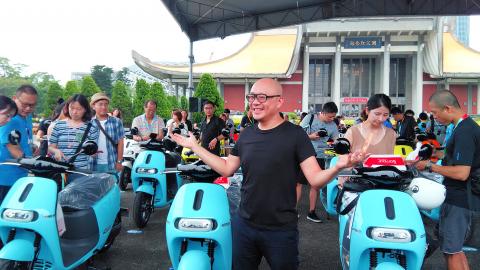Electric scooter maker Gogoro Inc (睿能創意) on Saturday said pre-orders for its Gogoro 2 series have set a company record.
Pre-orders for the scooters have surpassed 13,000 units as of the end of last month, after the company started taking orders on May 25, Gogoro cofounder and chief executive officer Horace Luke (陸學森) said.
He estimated that Gogoro, which last year sold nearly 13,000 scooters in Taiwan, will more than double its sales this year.

Photo: CNA
On Saturday, the first batch of Gogoro 2 scooters was delivered to customers at 34 locations around the nation. A handover event was held at the National Sun Yat-sen Memorial Hall, where 200 owners picked up their new vehicles.
An owner said he felt the new scooter had more torque than gasoline-powered scooters.
Changing batteries at swapping stations is also faster than refueling at a gasoline station, he added.
Gogoro operates nearly 400 battery-swapping stations around the nation and is to expand that number, Luke said.
The company has also signed agreements with 7-Eleven and the RT-Mart (大潤發) and Pxmart (全聯) hypermarket chains to set up battery-swapping stations at their outlets, he said.
The Gogoro 2 is priced at NT$73,800, but Taoyuan residents can purchase one for NT$38,800 thanks to subsidies offered by the Taoyuan City Government.
Luke said about 25 percent of Gogoro 2 buyers overall and more than 60 percent in Kaohsiung did so to replace their two-stroke scooters.
People replacing their two-stroke scooters are eligible for a government subsidy aimed at reducing air pollution caused by the gasoline-powered scooters.
This demonstrates the government’s determination to fight air pollution and shows that more people are trying out a new lifestyle, and identifying with Gogoro’s focus on “smart” transportation and energy, Luke said.
A total of 20,628 electric motorbikes were sold in Taiwan last year, according to Environmental Protection Administration statistics.
Of these, 62 percent were Gogoro scooters and 22 percent were made by China Motor Corp (中華汽車).
Overall, domestic motorbike sales rose 8.41 percent annually to 424,988 units in the first half of this year, according to data compiled by Taiwan Transportation Vehicle Manufacturers Association.
Kwang Yang Motor Co (光陽工業), the nation’s largest motorbike maker, reported sales of 156,979 units in the first six months, up 5 percent from a year earlier, with a 36.9 percent market share.
Sanyang Industry Co (三陽工業) the No. 2, sold 85,531 units, up 13.05 percent year-on-year, giving it a 20.1 percent market share.

Nvidia Corp CEO Jensen Huang (黃仁勳) today announced that his company has selected "Beitou Shilin" in Taipei for its new Taiwan office, called Nvidia Constellation, putting an end to months of speculation. Industry sources have said that the tech giant has been eyeing the Beitou Shilin Science Park as the site of its new overseas headquarters, and speculated that the new headquarters would be built on two plots of land designated as "T17" and "T18," which span 3.89 hectares in the park. "I think it's time for us to reveal one of the largest products we've ever built," Huang said near the

China yesterday announced anti-dumping duties as high as 74.9 percent on imports of polyoxymethylene (POM) copolymers, a type of engineering plastic, from Taiwan, the US, the EU and Japan. The Chinese Ministry of Commerce’s findings conclude a probe launched in May last year, shortly after the US sharply increased tariffs on Chinese electric vehicles, computer chips and other imports. POM copolymers can partially replace metals such as copper and zinc, and have various applications, including in auto parts, electronics and medical equipment, the Chinese ministry has said. In January, it said initial investigations had determined that dumping was taking place, and implemented preliminary

Intel Corp yesterday reinforced its determination to strengthen its partnerships with Taiwan’s ecosystem partners including original-electronic-manufacturing (OEM) companies such as Hon Hai Precision Industry Co (鴻海精密) and chipmaker United Microelectronics Corp (UMC, 聯電). “Tonight marks a new beginning. We renew our new partnership with Taiwan ecosystem,” Intel new chief executive officer Tan Lip-bu (陳立武) said at a dinner with representatives from the company’s local partners, celebrating the 40th anniversary of the US chip giant’s presence in Taiwan. Tan took the reins at Intel six weeks ago aiming to reform the chipmaker and revive its past glory. This is the first time Tan

CUSTOMERS’ BURDEN: TSMC already has operations in the US and is a foundry, so any tariff increase would mostly affect US customers, not the company, the minister said Taiwanese manufacturers are “not afraid” of US tariffs, but are concerned about being affected more heavily than regional economic competitors Japan and South Korea, Minister of Economic Affairs J.W. Kuo (郭智輝) said. “Taiwan has many advantages that other countries do not have, the most notable of which is its semiconductor ecosystem,” Kuo said. The US “must rely on Taiwan” to boost its microchip manufacturing capacities, Kuo said in an interview ahead of his one-year anniversary in office tomorrow. Taiwan has submitted a position paper under Section 232 of the US Trade Expansion Act to explain the “complementary relationship” between Taiwan and the US